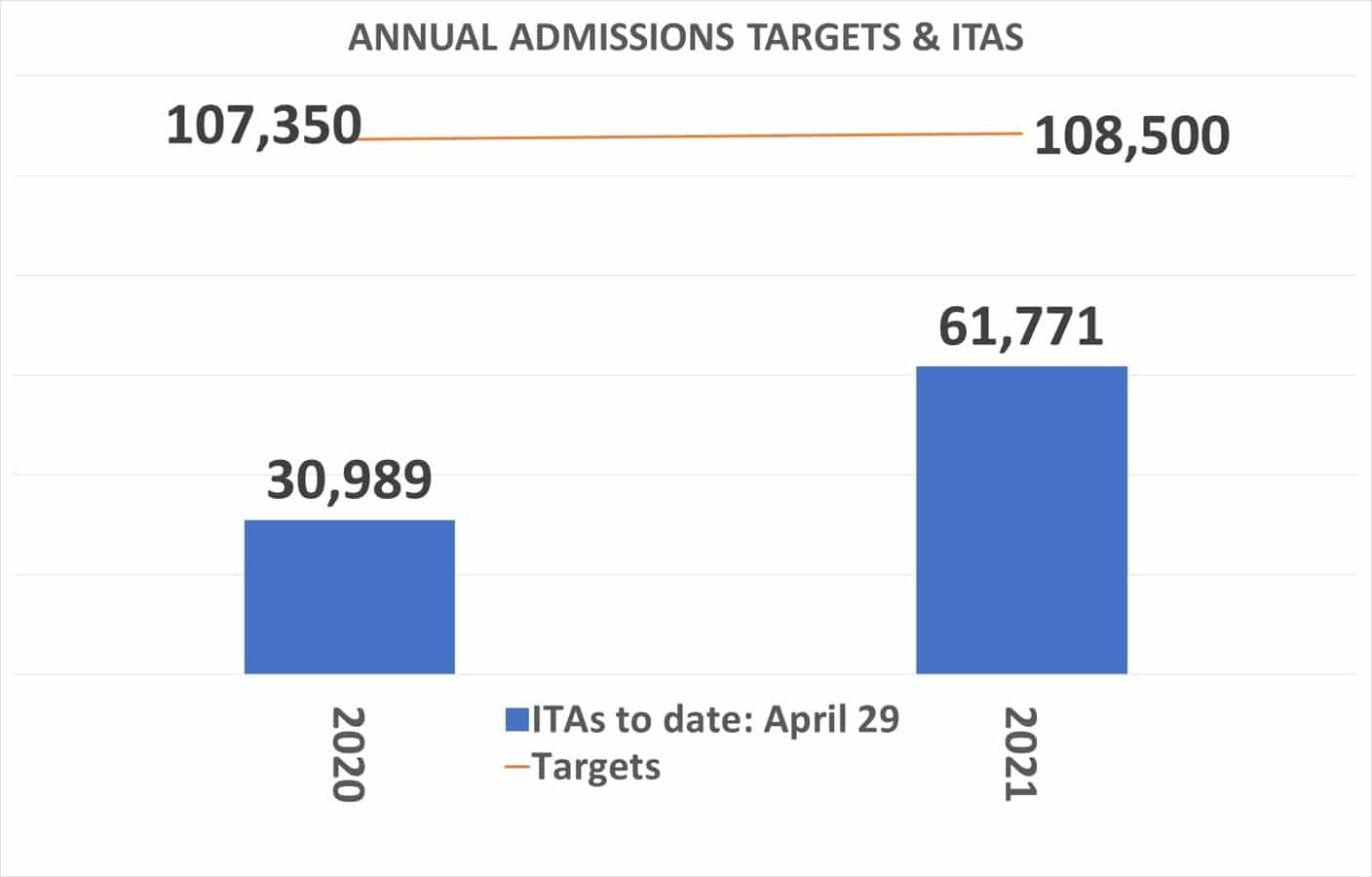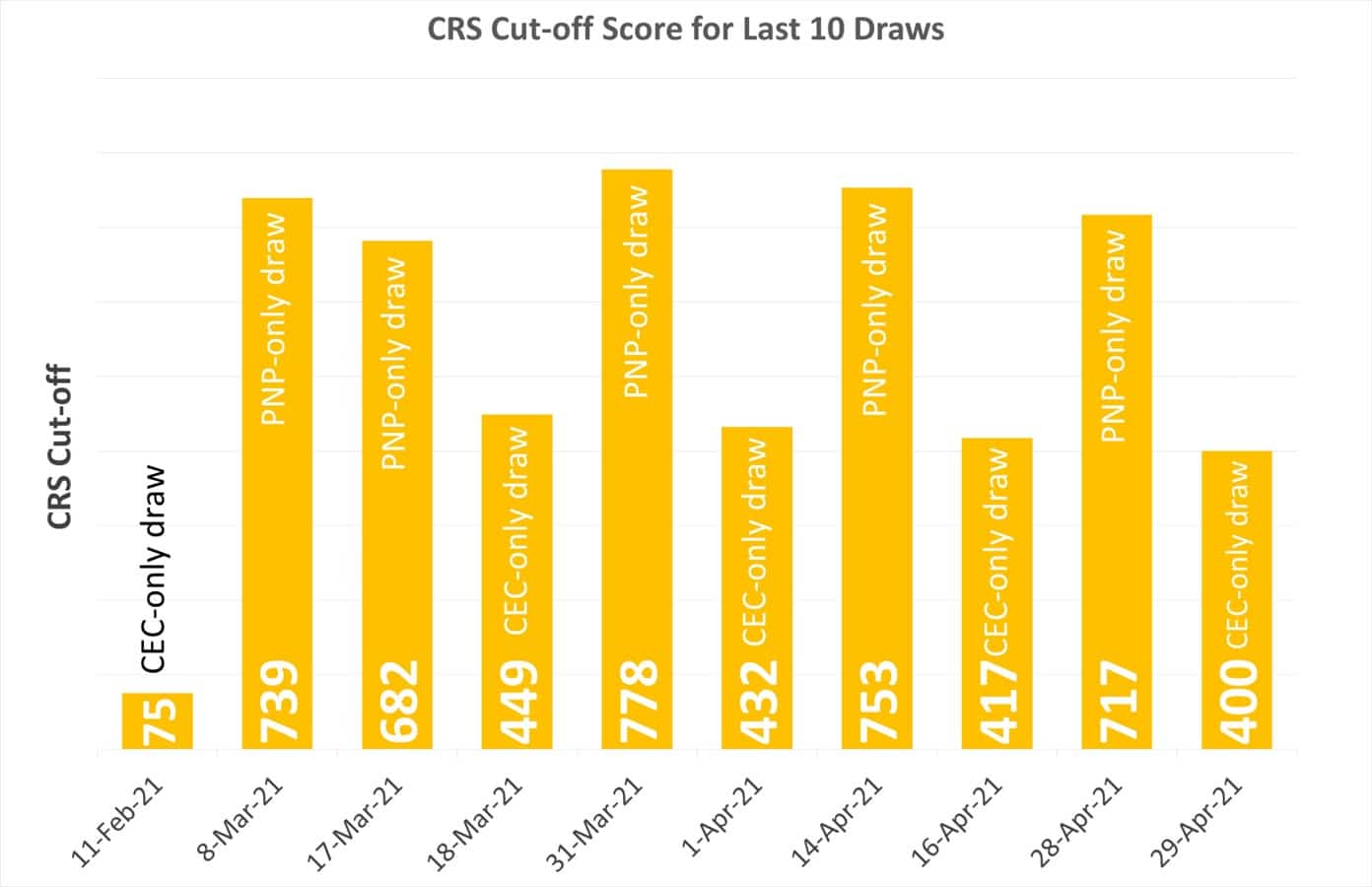Express Entry: CRS 400 for CEC candidates
Canada invited another 6,000 Express Entry candidates to apply for permanent residence on April 29.
Immigration, Refugees and Citizenship Canada (IRCC) invited candidates with scores of at least 400, and whom may be eligible for permanent residence through the Canadian Experience Class. This is the second lowest score ever for a CEC-specific draw.
As per the tie-break rule, candidates who had the minimum score of 400 were only invited if they submitted their Express Entry profile before April 24, 2021 at 15:24:49 UTC. IRCC publishes the cutoff time for the tie-break rule as an administrative requirement, regardless of whether there was an actual tie.
"The CEC was created in 2008 to help more temporary workers and international student graduates to transition to permanent residency," said David Cohen, Senior Attorney of Campbell Cohen. "Candidates need to have one year of Canadian work experience to be eligible for the CEC. This experience is highly valuable in Canada's job market. As such, we see many CEC candidates employed within their first year of landing."
Get a Free Express Entry Assessment
More focus on temporary residents in Canada
So far this year, IRCC has only held two types of program-specific Express Entry draws that target candidates who are likely already residing in the country. CEC candidates are especially prevalent in Canada, IRCC estimates about 90 per cent are applying domestically.
The other group of candidates that have been invited through Express Entry this year are those who have previously received a nomination through a Provincial Nominee Program (PNP). In order to get a nomination, PNP candidates often need work experience, study experience, or some other connection to the province. As such, these candidates also have a high proportion of candidates already in the country.
Although the pandemic has slowed down invitation rounds for outland Express Entry candidates, Canada just saw a record first quarter for the number of Invitations to Apply (ITAs) it issued. The new Express Entry draw brought the number of ITAs issued in 2021 to 61,771. This year's number is significantly higher than what it was the same time last year, in part due to the historically large February 13 Express Entry draw.

On average, IRCC holds two Express Entry draws every two weeks. One inviting PNP-only candidates, and the other inviting CEC-only candidates. PNP draws tend to have higher score requirements due to the automatic 600-point award. CEC draws tend to have lower score requirements because there are less candidates from other Express Entry-managed programs competing for Invitations to Apply (ITAs).

In an effort to achieve its target of welcoming 401,000 new immigrants in 2021, IRCC has created six new programs aimed at essential workers, and international student graduates. Starting May 6, Canada will open the door to 90,000 new immigrants plus an unlimited number of French-speaking essential workers and graduates.
What is Express Entry?
Express Entry is an application management system for the three Federal High Skilled programs: Canadian Experience Class, Federal Skilled Worker Program, and Federal Skilled Trades Program. Some PNPs also use the Express Entry system to invite candidates to apply for a provincial nomination.
If you want to immigrate to Canada through the Express Entry system, you first have to see if you are eligible. If so, you will get a score based on the Comprehensive Ranking System (CRS), which awards you points based on your skilled work experience, education, age, official language skills, and other factors.
IRCC issues ITAs to the highest-scoring candidates through Express Entry draws. After you send in your application, an IRCC immigration officer will review it. If they approve your application, the last step is to complete the landing process and officially become a Canadian permanent resident.
Who was invited?
The following is a hypothetical example of someone who may have been invited in the new draw.
Imelda is 33 years old and completed her bachelor’s degree in Canada. Since completing her degree, she has been working as a marketing consultant. She wrote the IELTS and scored an 8 in listening and reading and a 7.5 in each other category. Her CRS score of 440 would have been high enough to receive an ITA in the new Express Entry draw.
Get a Free Express Entry Assessment
© CIC News All Rights Reserved. Visit CanadaVisa.com to discover your Canadian immigration options.
- Do you need Canadian immigration assistance? Contact the Contact Cohen Immigration Law firm by completing our form
- Send us your feedback or your non-legal assistance questions by emailing us at media@canadavisa.com




